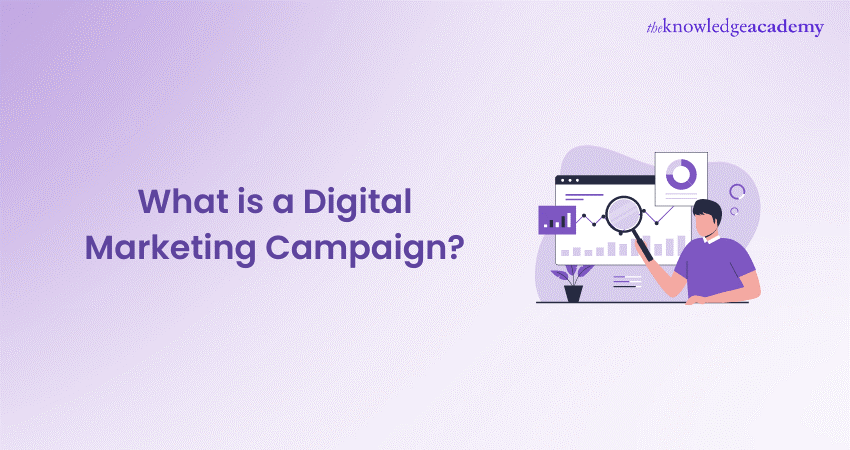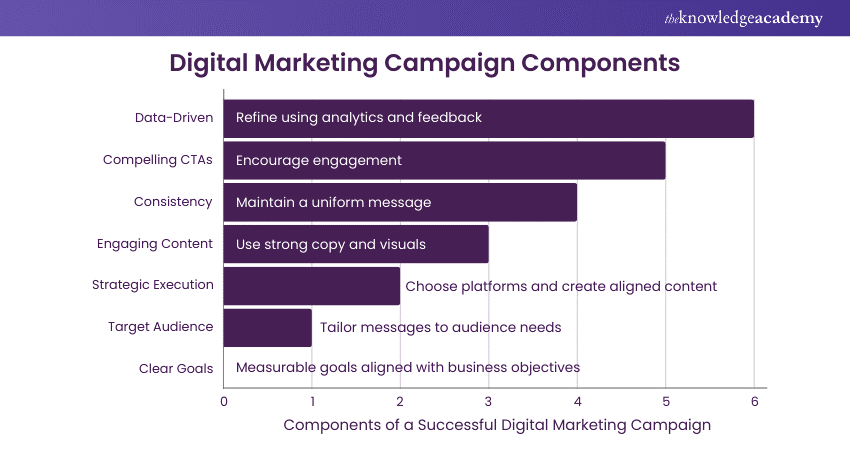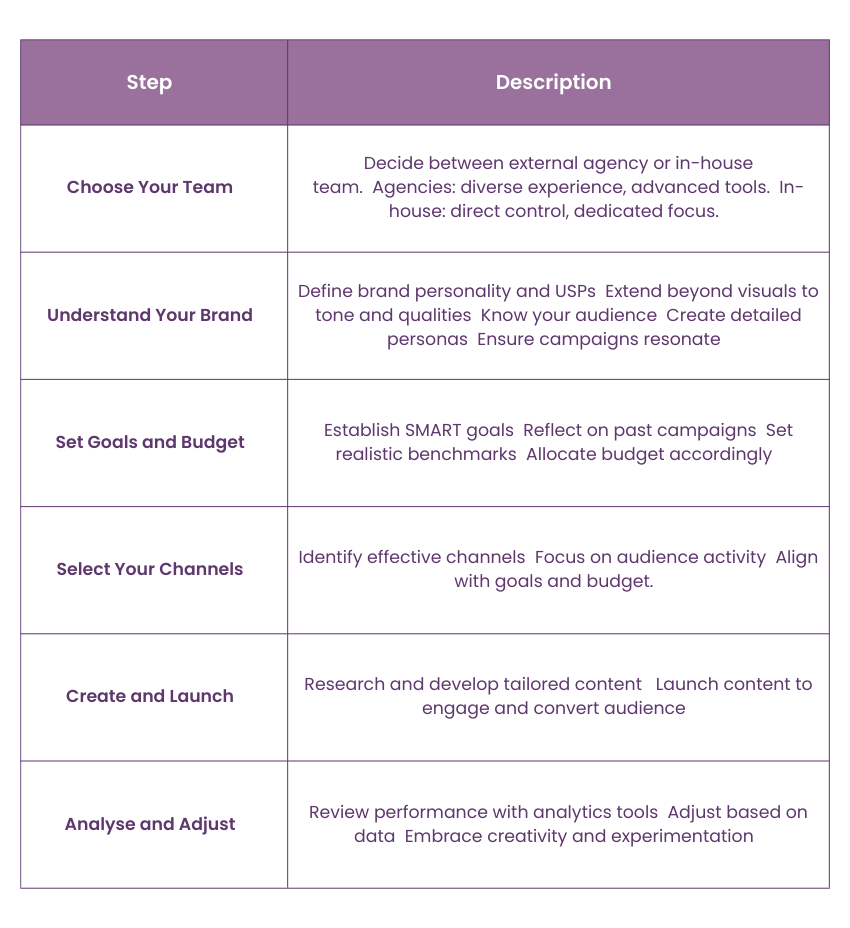We may not have the course you’re looking for. If you enquire or give us a call on +08000201623 and speak to our training experts, we may still be able to help with your training requirements.
Training Outcomes Within Your Budget!
We ensure quality, budget-alignment, and timely delivery by our expert instructors.

Assume that you’re launching a new product, but despite your best efforts, it’s not gaining traction. But what if there was a way to reach your target audience more effectively? This is where understanding “What is a Digital Marketing Campaign” becomes crucial. In this blog, we will talk about the concept of a Digital Marketing Campaign, illustrated with real-world examples.
By delving into “What is a Digital Marketing Campaign,” you’ll discover the key elements that make these campaigns successful. It will also talk about how brands like Nike or Apple create such impactful online presences.
Table of Contents
1) What is a Digital Marketing Campaign?
2) What Defines a Successful Digital Marketing Campaign?
3) Examples of Good Digital Marketing Campaigns
4) Types of Digital Marketing Campaigns
5) How to Create Digital Marketing Campaign Plan?
6) Conclusion
What is a Digital Marketing Campaign?
A Digital Marketing Campaign is a meticulously planned strategy designed to promote your business online. Its primary aim is to enhance your visibility in relevant digital spaces, thereby increasing brand awareness, engagement, and conversions with your target audience.
Digital Marketing encompasses any method that connects you to your audience through a screen. This includes a variety of techniques such as social media, email marketing, video content, blogs, chatbots, and display adverts.
Each of these methods plays a crucial role in reaching and engaging your audience, helping to build a robust online presence and support business growth. By effectively leveraging these digital channels, you can build a cohesive and impactful marketing strategy that resonates with your target market and fulfills your business objectives.
What Defines a Successful Digital Marketing Campaign?
An effective Digital Marketing Campaign meets its set goals and delivers a satisfying experience to its intended audience. Here are the essential components that make a Digital Marketing Campaign successful:

a) Clear Goals: The campaign should have well-defined marketing goals that are precise, quantifiable, and in sync with the broader objectives of the business.
b) Target Audience Identification: It’s crucial to know who you’re addressing. Tailoring the campaign’s message to fit your audience's specific needs, interests, and behaviours is key.
c) Strategic Execution: Choosing the right digital platforms, creating compelling content, and determining the messaging and offers are all strategic decisions that need to align with the target audience's preferences.
d) Engaging Content: To grab and hold the attention of your audience, you must use strong copywriting, impactful visuals, videos, and other interactive elements.
e) Consistency: Maintaining a consistent message across various digital channels ensures a cohesive User Experience (UX), strengthens brand identity, and builds trust.
f) Compelling CTAs: Effective calls-to-actions (CTAs) are critical as they encourage the audience to engage further, whether by making a purchase or signing up for a newsletter.
g) Data-driven Optimisation: To maximise the Return on Investment (ROI), the campaign must be continuously monitored, tested, and refined based on analytics and user feedback.
Create impactful campaigns that resonate with your audience – sign up for our Influencer Marketing Course now!
Examples of Good Digital Marketing Campaigns
Digital Marketing Campaigns are a testament to brands' creativity and strategic prowess. Here’s a refined look at four standout campaigns:
1) Airbnb’s “Made Possible by Hosts”
Airbnb’s 2021 campaign utilised user-generated content to create a compelling narrative through a video montage set to an evocative soundtrack. This approach not only showcased the unique Airbnb experiences but also tapped into renters' emotional memories, driving a significant increase in views and bookings.
Key Strategies:
a) Embrace Video Content: Engage consumers with video storytelling.
b) Mute-Friendly Viewing: Ensure content is impactful without sound.
c) User-Generated Content: Use real experiences as social proof.
d) Emotional Connection: Connect with audiences on an emotional level.
2) UNIQLO’s “Uncover”
UNIQLO’s omnichannel campaign for its HEATTECH clothing line combined digital billboards and social media to create an interactive giveaway experience. This innovative approach educated consumers and drove significant engagement and customer acquisition.
Key Strategies:
a) Incentivise Engagement: Attract attention with giveaways and discounts.
b) Encourage Sharing: Make campaign experiences social and shareable.
c) Omnichannel Presence: Blend in-store and online marketing efforts.
d) Lead Nurturing: Educate and retain interest through continued communication.
3) American Express’s “OPEN Forum”
Launched in 2007, American Express’s OPEN Forum harnessed the power of collaboration by featuring guest posts from industry experts. This content marketing strategy effectively positioned the company as a thought leader and continues to be a primary source of new leads.
Key Strategies:
a) Leverage Expertise: Utilise guest posts for authoritative content.
b) Promote Community: Foster a hub for professional networking.
c) Cross-Vertical Value: Offer diverse insights across business topics.
d) Word-of-mouth Promotion: Encourage contributors to share their work.
4) Slack’s Word-of-Mouth Marketing
Slack’s “The Wall of Love” campaign showcased positive user feedback on Twitter, demonstrating the brand’s commitment to customer satisfaction and leveraging social proof to fuel growth.
Key Strategies:
a) Ease of Participation: Use existing platforms for user engagement.
b) Customer Feedback: Utilise positive reviews as marketing material.
c) Consistent Delivery: Align marketing promises with user experience.
d) Visual Engagement: Enhance social media posts with multimedia elements.
5) Dove’s “Project #ShowUs”
Dove’s initiative aimed to challenge the underrepresentation of real women in media. The 2019 campaign, “Project #ShowUs,” curated a vast collection of stock photos showcasing diverse women produced by female photographers from Girlgaze.
This project has grown into the largest stock photo library by women, available on Getty Images, with a portion of proceeds funding the initiative. It achieved unanimous positive sentiment, demonstrating the impact of aligning with a broader mission and embracing authentic representation.
Key Strategies:
a) Pursue a Greater Cause: Elevate your digital campaigns by aligning them with a cause larger than the brand itself.
b) Address Industry Challenges: Utilise your campaigns to tackle significant issues like representation or inequality.
c) Embrace Authenticity: Opt for genuine imagery over perfection to resonate with a larger audience and foster brand loyalty.
d) Visual Storytelling: Use powerful visuals to convey your message, as they can communicate complex stories effectively.
6) Lyft’s Referral Program
To differentiate from Uber, Lyft leveraged its user base to advocate for the brand through a referral program. This program incentivised users with substantial rewards for inviting new riders and drivers, effectively turning customers into a cost-effective marketing force.
Key Strategies:
a) Formalises Advocacy: Implement structured referral programmes to transform users into brand ambassadors.
b) Valuable Incentives: Offer compelling rewards to motivate users to make referrals.
c) Simplify Referrals: Ensure the referral process is user-friendly to maximise participation.
d) Monitor Advocacy: Track referrals with unique codes to identify and reward top advocates.
7) Red Bull’s “Stratos”
Red Bull’s “Stratos” campaign in 2012 captured global attention by live-streaming a record-breaking space jump. The event aligned with the brand’s adventurous image and garnered millions of views, emphasising the power of live events and storytelling.
Key Strategies:
a) Host Live Events: Create a sense of urgency and community with live broadcasts.
b) Entertainment Over Promotion: Focus on engaging content that embodies the brand’s essence rather than direct promotion.
c) Set Records: Aim to achieve remarkable feats that align with your brand’s identity.
d) Narrative Engagement: Build anticipation and engagement through compelling storytelling.
8) Sephora’s Omnichannel Experience
Sephora thrives in the digital age by blending online and in-store experiences. Its app uses AI and AR for virtual try-ons, seamlessly integrated with its e-commerce platform, enhancing the shopping experience and conversion rates.
Key Strategies:
a) Immersive Experiences: Create interactive digital experiences that mimic physical interactions with products.
b) Omnichannel Presence: Be accessible across various platforms to offer flexibility to consumers.
c) Data-Driven Personalisation: Use collected data to tailor the shopping experience for each user.
d) Confidence in E-commerce: Provide tools that reduce uncertainty for online shoppers, improving conversion rates.
9) Heineken’s “Cheers to All”
Heineken’s “Cheers to All” campaign addressed gender stereotypes in beverage preferences with a humorous twist, promoting inclusivity and expanding its market to all genders.
Key Strategies:
a) Challenge Stereotypes: Use your campaign to playfully subvert expectations.
b) Humour in Messaging: Approach sensitive topics with a light-hearted tone to engage audiences positively.
c) Global Appeal: Craft content transcending language and cultural barriers for wider reach.
d) Native Social Media Content: Increase engagement by directly uploading content to social platforms.
Types of Digital Marketing Campaigns
Digital Marketing Campaigns are strategically tailored to different goals, audiences, and budgets based on the objective. Below are some of the types of Digital Marketing Campaigns:
1) Social Media Campaigns
These campaigns harness social networks like Facebook, Instagram, Twitter, and LinkedIn to connect with audiences.
Strengths:
a) Targeted Advertising: Pinpoints ideal customers by demographics and interests.
b) Interactive Content: Engages users with images, videos, and live streams.
c) Cost-effective: Reaches broad audiences at lower costs than traditional media.
d) Trackable: Analyses campaign performance with in-depth analytics.
Weaknesses:
a) Algorithm Dependence: Limited control over platform algorithms affecting reach.
b) High Competition: Creating a distinguished brand identity and market positioning in the digital space is tough.
c) Brief Engagement: Content must be sharp to cater to the short attention spans of an average online user.
2) Email Marketing Campaigns
This involves sending targeted messages to a subscribed audience.
Strengths:
a) Direct Outreach: Foster relationships through direct communication.
b) Personalisation: Tailor messages based on user data and behaviour.
c) High ROI: Potentially significant returns through lead generation and sales.
d) Analytics: Detailed insights into campaign engagement and performance.
Weaknesses:
a) Inbox Clutter: Competing against numerous other emails for attention.
b) Spam Challenges: Risk of emails being filtered into spam folders.
c) Unsubscription: Maintaining interest is key to preventing list attrition.
3) Pay-per-click (PPC) Campaigns
Advertise by bidding on keywords to display ads on SERPs and other platforms.
Strengths:
a) Immediate Impact: Quick results for businesses seeking rapid visibility.
b) Focused Targeting: Ads are shown to users based on specific search queries.
c) Budget Control: Adjust spending based on campaign performance and goals.
d) Measurable: Detailed tracking of clicks, conversions, and other metrics.
Weaknesses:
a) Costly Keywords: High competition can drive up the price of popular keywords.
b) Click Fraud Risks: False clicks can inflate costs without real engagement.
c) Limited Branding: More suited for immediate sales than long-term branding.
4) Search Engine Optimisation (SEO) Campaigns
Improve website visibility on SERPs for chosen keywords.
Strengths:
a) Organic Reach: Attract visitors naturally without paid advertising.
b) Sustained Growth: Rankings can improve and benefit the business over time.
c) Relevance: Connect with users actively seeking related information or products.
d) Cost Efficiency: More affordable in the long-term in comparison to paid ads.
Weaknesses:
a) Time Investment: Continuous efforts and patience are required for results.
b) Algorithm Updates: Frequent changes can necessitate strategy shifts.
c) Competitive Fields: It is difficult to rank in terms of saturated markets.
d) Indirect Conversions: SEO may not directly lead to immediate sales.
Each campaign type offers unique benefits and challenges, and the choice depends on your business's specific needs and goals.
Boost your virtual presence and drive targeted traffic with our expert-led Search Engine Marketing (SEM) Training – join us now!
How to Create Digital Marketing Campaign Plan?
Creating a Digital Marketing Campaign plan is an important step in ensuring the success of your online marketing efforts. Here’s a streamlined guide to crafting your plan:

1) Choose Your Team: Decide between an external agency or an in-house team. Agencies bring diverse experience and access to advanced tools, while in-house teams offer direct control and dedicated focus. Consider the balance of expertise, cost, and control that works for your business.
2) Understand Your Brand: Define your brand’s personality and unique selling propositions (USPs). Your brand extends beyond visuals to the tone and distinct qualities that set you apart. Know your audience well, create detailed personas, and ensure your campaigns resonate with their interests and needs.
3) Set Goals and Budget: Establish clear, SMART goals—specific, measurable, attainable, relevant, and timely. Reflect on past campaigns to set realistic benchmarks and allocate a budget that aligns with your objectives.
4) Select Your Channels: Identify the most effective channels for your campaign. Consider SEO, digital advertising, content marketing, email marketing, social media marketing, and web design. Focus on where your audience is most active and what fits your goals and budget.
5) Create and Launch Content: Research and develop content tailored to your chosen channels and audience preferences. Once ready, launch your content to engage and convert your audience.
6) Analyse and Strategise: Regularly review your campaign’s performance using analytics tools. Be prepared to adjust based on the data. Embrace creativity, and don’t shy away from experimenting to find what works best for your brand.
Remember, the essence of a successful Digital Marketing Campaign is flexibility and a willingness to adapt based on performance insights. Keep learning and refining your approach for the best results.
Unlock the full potential of your marketing strategies – register for our Digital Marketing Tools Training.
Conclusion
In conclusion, grasping “What is a Digital Marketing Campaign” is essential for any business to excel in the digital age. By effectively utilising digital channels, you can significantly enhance your brand’s visibility and drive substantial conversions. In today’s digital world, a Marketing Campaign is more than just a plan—it’s a crucial connection that propels a brand toward its online future.
Transform your career with our expert-led Digital Marketing Courses – join us now!
Frequently Asked Questions

Update your campaign as often as needed to keep up with market trends and audience preferences, typically every quarter.

Certainly! Digital Marketing democratises the competitive landscape, empowering small businesses to effectively challenge larger corporations.

The Knowledge Academy takes global learning to new heights, offering over 30,000 online courses across 490+ locations in 220 countries. This expansive reach ensures accessibility and convenience for learners worldwide.
Alongside our diverse Online Course Catalogue, encompassing 17 major categories, we go the extra mile by providing a plethora of free educational Online Resources like News updates, Blogs, videos, webinars, and interview questions. Tailoring learning experiences further, professionals can maximise value with customisable Course Bundles of TKA.

The Knowledge Academy’s Knowledge Pass, a prepaid voucher, adds another layer of flexibility, allowing course bookings over a 12-month period. Join us on a journey where education knows no bounds.

The Knowledge Academy offers various Digital Marketing Courses, including the Campaign Planning Training, Pinterest Marketing Course, and Display Advertising Course. These courses cater to different skill levels, providing comprehensive insights into Affiliate Marketing Tools.
Our Digital Marketing Blogs cover a range of topics related to Campaign Marketing, offering valuable resources, best practices, and industry insights. Whether you are a beginner or looking to advance your Digital Marketing Skills, The Knowledge Academy's diverse courses and informative blogs have got you covered.
Upcoming Digital Marketing Resources Batches & Dates
Date
 Campaign Planning Training
Campaign Planning Training
Fri 10th Jan 2025
Fri 14th Feb 2025
Fri 11th Apr 2025
Fri 23rd May 2025
Fri 8th Aug 2025
Fri 26th Sep 2025
Fri 21st Nov 2025







 Top Rated Course
Top Rated Course



 If you wish to make any changes to your course, please
If you wish to make any changes to your course, please


